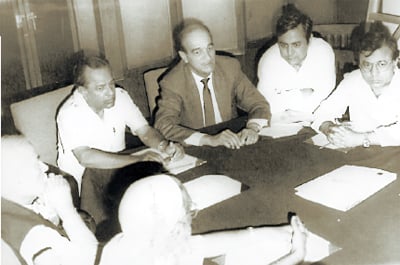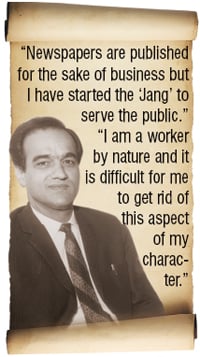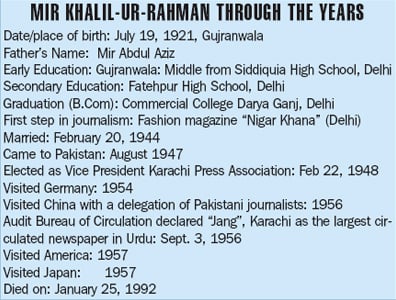A PROFESSIONAL PAR
EXCELLENCE
By
Muhammad Humayun Aziz
The
founder, owner, and editor-in-chief of Jang group Mir Khalil-ur-Rahman
departed for his heavenly abode on January 25, 1992. During 36 years
of my association with Jang group, I had the privilege of his guidance
and patronage in pursuit of my journalistic duties. I had joined
Jang as sub-editor but soon promoted as night shift incharge. Those
days in Urdu newspapers, night shift incharge used to be a key figure
as all the creeds of various agencies, important stories filed by
reporters and correspondents and photos submitted by photographers
all landed at his desk, and he, with the advice and directive of
news editor, would distribute these for translating, editing and
pasting on various pages.
 Mir
saheb always remained in touch with the news editor and the night
shift incharge to get first hand knowledge of the news .This is
the period when I learned most from Mir saheb not only journalism
but also the much-needed changes in life style in my capacity as
shift Incharge. Mir saheb was not only the owner of newspaper but
was also a thorough journalist — whether it was translation
of news (in Urdu newspapers, translation from English to Urdu is
very important as main news sources are usually in English), reporting
of events, radio monitoring (there were no TV channels in those
days), proof reading, event photography, editorial writing, etc
he performed all these tasks at various occasions and it was because
of these qualities he immediately spotted errors wherever
occurred, and he remained aware of the worth of each and
every journalist working in Jang. It was due to this knowledge about
his workers he would write their ACRs himself. Mir
saheb always remained in touch with the news editor and the night
shift incharge to get first hand knowledge of the news .This is
the period when I learned most from Mir saheb not only journalism
but also the much-needed changes in life style in my capacity as
shift Incharge. Mir saheb was not only the owner of newspaper but
was also a thorough journalist — whether it was translation
of news (in Urdu newspapers, translation from English to Urdu is
very important as main news sources are usually in English), reporting
of events, radio monitoring (there were no TV channels in those
days), proof reading, event photography, editorial writing, etc
he performed all these tasks at various occasions and it was because
of these qualities he immediately spotted errors wherever
occurred, and he remained aware of the worth of each and
every journalist working in Jang. It was due to this knowledge about
his workers he would write their ACRs himself.
When
I was posted as district pages incharge, I came to know that the
Tarzan serial appearing daily with cartoon images was being translated
by Mir saheb himself. In those days it was a very popular serial.
I sought Mir saheb’s permission for translating this serial.
On this Mir saheb told me that there used to be mistakes and readers
would write letters . The serial had Urdu translation under the
cartoon images and English version with these images. The main reason
of translation error was that the translator had not read the whole
story. I was a reader of Tarzan serial from my childhood and knew
that after 25 years they again start from the beginning repeating
the story. Mir saheb allowed me and was so satisfied that even after
my transfer from district pages I had to continue translating Tarzan
serial. 
Mir
saheb usually came to office around 11 in the morning and would
remain in the office almost till midnight. After that he would
remain in touch with all stations from his home till the
last copy was sent to the press for printing. There were no news
channels and 1.00 a.m. news bulletin of BBC was very important as
it was the last main bulletin before the last copy was sent to the
press. Mir saheb himself monitored this bulletin and the programme
“24 hours” broadcast immediately after the bulletin.
The “24 hours” comprised reports of BBC correspondents
all over the world. After the end of bulletin Mir saheb used to
phone me and ask whether we had monitored it or not. However, if
we had missed it, because of radio monitor Aleem Durrani’s
absence or some other reason, Mir saheb would not mind and he would
dictate us on phone all important news of the day.
Besides
the radio monitoring, he at times he also reported various events.
When late Zulfiqar Ali Bhutto came to power he went from 70 Clifton
to Kakri ground in Lyari in a long procession. There he addressed
a public meeting in the early hours of morning. Mir saheb accompanied
the procession as a reporter and also covered the public meeting.
Next day, it was Jang’s main page headline and the whole story
was written by Mir saheb himself all alone.
Mir
saheb was was very supportive to his fellow journalists. A correspondent
of the official agency APP narrated this story to me: “late
president Gen Zia-ul-Haq was on a state visit to a foreign country.
Mir saheb was among the journalists accompanying him. When Zia started
the briefing the APP correspondent switched on his tape recorder.
After the briefing, he went to his room to transcribe it so that
he could send the story to his office back in Pakistan. But to his
utter astonishment he found out that due to some technical fault
not a single word was recorded. He was government news agency’s
correspondent and this mistake could have cost him his job. With
white face he came out of his room. Mir sahab saw him and asked
him why he was so upset? He told Mir Sahab what has happened. Mir
smiled and asked him to come to his room, where Mir sahib dictated
him the whole briefing.
 Mir
saheb remained involved in all important events as they unfolded
over the years. The day when Gen Zia-ul-Huq overthrew Bhutto’s
govt and declared Martial Law the initial information about it came
at about midnight. The information was that secretary general of
Pakistan National Alliance (Pakistan Qaumi Ittehaad) and a leader
of Jamaat-i-Islami Prof Ghafoor Ahmad has been arrested. Jang Pindi
immediately conveyed it to Mir saheb who alerted us. Then he himself
started using his contacts in the higher echelons of power to get
further information. Soon we learnt that Mufti Mehmud has also been
arrested and Mumtaz Bhutto, Abdul Hafiz Pirzada and other federal
ministers have been arrested too. By 3.00 a.m in the morning, it
was almost confirmed that General Zia-ul-Huq staged the coup. Soon
all the details were available but, off the record. Now the question
was as to how the news could be given without official confirmation.
Mir saheb found the way. He told us to get the story calligraphed
and also the banner head line. He asked us to keep the copy ready
and as soon the news is broadcast in radio Pakistan’s early
morning bulletin the copy should be delivered to press. Mir
saheb remained involved in all important events as they unfolded
over the years. The day when Gen Zia-ul-Huq overthrew Bhutto’s
govt and declared Martial Law the initial information about it came
at about midnight. The information was that secretary general of
Pakistan National Alliance (Pakistan Qaumi Ittehaad) and a leader
of Jamaat-i-Islami Prof Ghafoor Ahmad has been arrested. Jang Pindi
immediately conveyed it to Mir saheb who alerted us. Then he himself
started using his contacts in the higher echelons of power to get
further information. Soon we learnt that Mufti Mehmud has also been
arrested and Mumtaz Bhutto, Abdul Hafiz Pirzada and other federal
ministers have been arrested too. By 3.00 a.m in the morning, it
was almost confirmed that General Zia-ul-Huq staged the coup. Soon
all the details were available but, off the record. Now the question
was as to how the news could be given without official confirmation.
Mir saheb found the way. He told us to get the story calligraphed
and also the banner head line. He asked us to keep the copy ready
and as soon the news is broadcast in radio Pakistan’s early
morning bulletin the copy should be delivered to press.
Mir
sahib used to work from 11.00 a.m. till 03.00 am. After office hours,
he remained available on phone at his residence. Even two hours
after midnight whenever I called him he would pick the receiver
at the second bell and would say ‘khalil’. In those
days, there used to be only one Eid holiday. When hawkers demanded
two holidays on Eid Mir saheb supported them and said he would also
get these holidays because he worked seven days a week and enjoyed
holiday only when the newspaper did not publish.
-The
writer is Resident editor, Jang London
|

